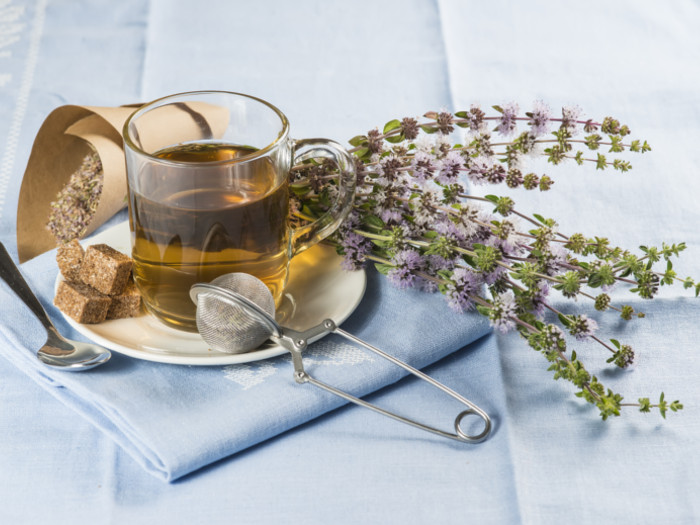The use of pennyroyal dates back to ancient times, but it still has some benefits that make it a popular herbal remedy today.
What is Pennyroyal?
Pennyroyal scientifically known as Mentha pulegium is a common plant in the mint family, Lamiaceae, that is commonly found in North America, the Middle East, and Europe. Some of the other common names include pennyrile, squaw mint, mosquito plant, and pudding grass. When the leaves are crushed, they release a powerful aromatic scent that is reminiscent of spearmint. Pennyroyal does have toxic properties, and should not be directly consumed, particularly in the form of its essential oil. In some cases, ingestion of the oil has resulted in death, and there is no known treatment for pennyroyal toxicity. [1]
While this herb was once used for rudimentary abortions, due to its menstruation-stimulating ability, the dose required for an abortion is close to the lethal limit and is no longer considered safe. There are some antioxidant, antimicrobial, and anti-inflammatory properties of this herb, including notable levels of alpha-terpineol and pulegone, but it is still considered a dangerous substance. Only use extremely mild doses and be sure to speak with a trained herbalist or medical professional first.

Pennyroyal Uses
This herb has many different uses, including the following:
- Insecticide
- Digestive aid
- Muscle relaxant
- Tea
- Topical remedy
- Skin care
Let us discuss them in detail below.
Tea
Pennyroyal tea was a popular abortifacient beverage that was traditionally given to women who wanted to stop a pregnancy. This is no longer advised in any way, as it can be toxic or lethal at high levels. [2]
Insecticide
Pennyroyal acts as an effective insect repellent and insecticide that eliminate most pests very rapidly, due to its powerful scent. Make sure to use it in small doses. [3]
Digestion
A drop of pennyroyal oil in a glass of water can stimulate bowel movement, which can clear up digestive issues.
Respiration
Drinking a weak form of pennyroyal tea can have anti-inflammatory effects on the respiratory tracts and will soothe coughs and sore throats.
Inflammation
The oil from this herb has long been used as a topical remedy for inflammation, particularly when applied to aching joints and muscles. Topical irritation is common, so use a small amount at first. [4]
Skin Diseases
Applying a pennyroyal tincture, in moderate and safe doses, can improve the symptoms of eczema, rosacea, psoriasis or any other skin disease. [5]
Weakness
Drinking this tea is known to boost energy production and stimulate the body, helping you to overcome weakness, specifically when recovering from an illness or injury.
Side Effects of Pennyroyal
As mentioned, the side effects of consuming pennyroyal in any form can be dangerous, so extreme caution must be taken. Some of the side effects include the following: [6]
- Liver damage
- Kidney damage
- Stomach pain
- Nausea
- Vomiting
- Fever
- Restlessness
- Dizziness
- Vision
- Hearing problems
- High blood pressure
- Abortion
- Lung failure
- Brain damage
- Complications of pregnancy
- Breastfeeding
- Liver disease
This herb should not be used by children in any form. Consuming as little as 5 grams of this herb can be lethal.
Recommended Dosage of Pennyroyal
There is a limited amount of research on a safe dosage, and most medical experts recommend avoiding pennyroyal altogether. However, brewing a mild tea with these dried leaves can be a better way to benefit, without suffering serious side effects. A tincture with pennyroyal oil can be applied to the skin, but pay attention to any allergic reactions, as it may demonstrate a high sensitivity to the herb, putting you at a higher risk if you continue using it. [7]
